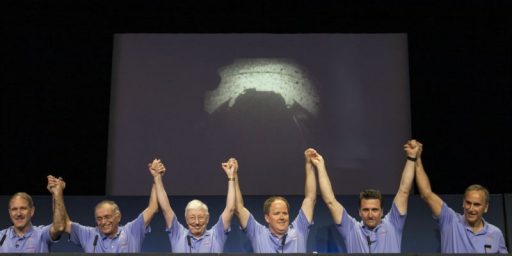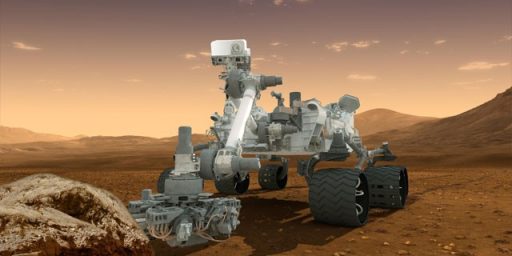Big Curiosity News Not Really Big News
Last week I noted rumors that we’d soon be getting news of an important discovery by the Mars Curiosity Rover. Well, it turns out that it was all just a big misunderstanding:
When Curiosity chief scientist John Grotzinger sat down with NPR on Nov. 13, it was to discuss the rover’s mission on Mars. But when the interview aired last week, it was just one quote on soil samples that made headlines: “This data is gonna be one for the history books.”
It didn’t take long for Twitter, Facebook and even other news organizations to pick up the quote. Similar to a childhood game of “Telephone,” that statement ballooned into one of the week’s biggest stories: After just a few months on Mars, the Curiosity rover had made, in the NPR reporter’s words, an “earth-shaking” discovery. One so big that NASA had to quadruple-check the results.
That rumor, however, isn’t exactly accurate.
The quote heard around the world came shortly after Grotzinger explained that NASA had just received the initial data from Curiosity’s first soil experiment using a new Sample Analysis at Mars (SAM) instrument, which is capable of identifying organic compounds.
Naturally, the public assumed that this meant Curiosity had discovered a complex organic molecule. But while NASA does have the latest soil samples, the mission team tells Mashable that researchers haven’t determined that particular groundbreaking discovery. In fact the rover drove away from the location just five days later, taking more samples along the way.
What Grotzinger was actually trying to convey is that Curiosity’s data over her entire two-year mission will further our knowledge of Mars more than ever before, making it a historical mission. This is entirely factual. In her short time on the Red Planet, Curiosity has already made significant discoveries — like finding an ancient streambed where water once flowed. More recently, she determined that astronauts could survive Mars radiation levels.
As for Grotzinger’s comment about checking and re-checking the data before releasing it to the public, that’s just standard scientific procedure. This is especially true when it’s the first set of data from a new instrument.
Cue Emily Litella:





And here I thought they’d found Marvin’s little skeleton. Ah well.
@Doug Mataconis:
John Grotzinger slipped up and told NPR things he wasn’t allowed to and now the government is suppressing what Curiosity actually found.
THE TRUTH IS OUT THERE!!!!
Are all of NASA’s science PR people poleaxed? The physical parts of the missions seem well communicated but the science PR leaves a lot to be desired.
This is no surprise. I learned many years ago to be skeptical of sensationalistic scientific headlines.
@Stress N. Strain: Frankly, I have to bring up a lot of self control whenever I hear about some ‘cancer cure’. Those news reports appear at least once a week.
I’m a Stage IV cancer survivor who passed the median survival rate for their cancer 4 years ago. There’ no miracle cure. Just hope at finding a better way of fighting the big C.